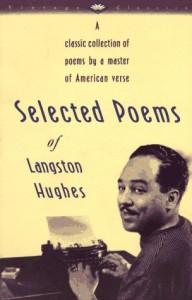 Langston Hughes remains the most beloved and well-known poet of the Harlem Renaissance, a period spanning roughly from the end of the First World War to the beginning of the Great Depression. Hughes was concerned with promoting a positive black identity, one not defined by the ubiquity of white culture or shaped in contrast to it, and it was to this end that he began incorporating jazz rhythms into his verse. His most famous poems are celebrations of blackness and black experience or dirges for the unsung sufferings and degradations of his people, but there are a handful of equally impressive poems that puncture this group identity and paint a devastating portrait of individual struggle – for identity, for connection, for acceptance. Biographical studies of Hughes suggest that he was gay, or at least that he had male lovers, but if this is true it is suppressed in his published verse; like so many poets before him, Hughes offers only a teasing glance into a psyche he ultimately declines to expose.
Langston Hughes remains the most beloved and well-known poet of the Harlem Renaissance, a period spanning roughly from the end of the First World War to the beginning of the Great Depression. Hughes was concerned with promoting a positive black identity, one not defined by the ubiquity of white culture or shaped in contrast to it, and it was to this end that he began incorporating jazz rhythms into his verse. His most famous poems are celebrations of blackness and black experience or dirges for the unsung sufferings and degradations of his people, but there are a handful of equally impressive poems that puncture this group identity and paint a devastating portrait of individual struggle – for identity, for connection, for acceptance. Biographical studies of Hughes suggest that he was gay, or at least that he had male lovers, but if this is true it is suppressed in his published verse; like so many poets before him, Hughes offers only a teasing glance into a psyche he ultimately declines to expose.
Hughes initially drew attention not only for his exploration of black identity, which had received little serious treatment by the American culture at large, but for his countercultural assertion that “black is beautiful.” He was addressing not only white racism but an internalized self-loathing within black culture that held that to be fair-skinned or posses straight hair entailed some innate superiority; in this, he anticipated the Black Power movement that would follow but which he found alienating, even chauvinistic. His treatment of black identity ranges from heartbreaking to playful, idiomatic to highly stylized. Thus, in “American Heartbreak”:
I am the American heartbreak –
Rock on which Freedom
Stumps its toe –
The great mistake
That Jamestown
Made long ago.
To call yourself “the American heartbreak” and then descend into the metaphor of a rock on which Freedom (capitalized, in case anyone could fail to comprehend the historical and cultural significance of that one word) stubs its toe is to approach bathos, as it is to encompass all of the depredations of slavery in “the great mistake,” but in Hughes this is mere playfulness, a defensive kind of humor that he resorts to as a survival mechanism, as in “Bad Morning,” where he writes, “Here I sit / With my shoes mismated. / Lawdy-mercy! / I’s frustrated!” The tone may be light and playful, but the subtext is grief and frustration, all the more potent for being unexpressed.
In some of his more direct poems, the tone becomes more sombre, pensive, but rarely, if ever, does Hughes express anger and certainly never fury. Consider the prophetic “I, Too.”
I, too, sing America.
I am the darker brother.
They send me to eat in the kitchen,
When company comes,
But I laugh,
And eat well,
And grow strong.Tomorrow,
I’ll be at the table
When company comes.
Nobody’ll dare
Say to me,
“Eat in the kitchen,”
Then.Besides,
They’ll see how beautiful I am
And be ashamed –I, too, am America.
It is to Whitman, his spirit or his legacy, that Hughes addresses himself here, Whitman the poet who boldly claimed that by singing of himself he was likewise singing of America. Hughes makes no less a claim for himself and for his black brothers and sisters, and dares to dream of a “tomorrow” when he, too, will have his seat at the table. I do not know who the “they” is that he addresses (white people? America?), nor could I claim to speak for them if I did, but I will allow myself to express the hope that so beautiful and so dignified a soul as Langston Hughes is never again made to feel inferior – by a nation, its people or its laws. It is rather we who should aspire to be worthy of him.